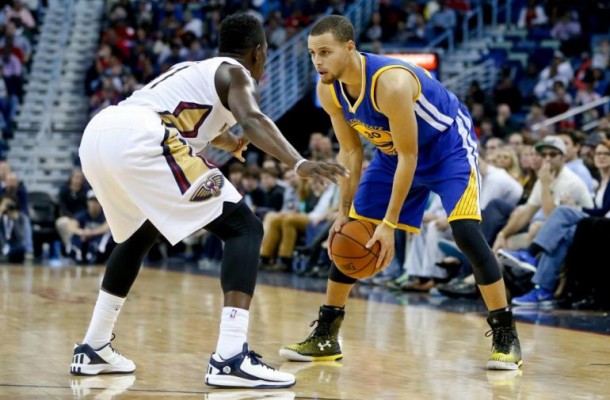The summers of 2012 and 2013 felt important for the future of the point guard position in the moment, but together they now especially feel like a definitive moment. Because many of these players will soon be free agents, it is a good time to take stock of this group of veteran playmakers. The biggest story has been the rise of Stephen Curry into a superstar and two-time MVP. Lesser known but equally important for setting the market and understanding the place of these guards in the league is the development of Jrue Holiday, as a player and an investment.
The different trajectories of Curry, Holiday and Jeff Teague, who each signed four-year deals in 2013, represent a microcosm of the changes that have taken place across the league over the last four years. The 2013 season was LeBron James’s last in Miami, Tim Duncan was still a fixture in the San Antonio rotation, and Anthony Davis was fresh off a limited rookie season. Curry and his Warriors hadn’t even broken through to the playoffs. Teague counted Josh Smith and Zaza Pachulia as teammates. Heck, the Pelicans didn’t even exist yet.
Holiday would be acquired that summer for the draft pick that became Nerlens Noel, and extended a month later. The Pelicans team that would make the playoffs in 2015 was taking shape, and Holiday was expected to be their leader on the court. After he made the Eastern Conference All-Star team the prior February, adding Holiday to a core that already had plenty of offensive firepower was expected to be a homerun. Unfortunately, he played only 74 games over the next two seasons, and his coach was fired before he ever really had a chance to assimilate into the system.
The 2017 free agent whose career arc most closely follows Holiday’s is actually George Hill, who signed his five-year extension with the Indiana Pacers in 2012, a season before most of his free agent classmates. Hill played only 43 games in the second year of his deal, and struggled through a mere 49 this season on his new team, the Utah Jazz. Both the injury history and team movement (Hill is on his third team after being drafted by the Spurs) bring to mind Holiday’s profile as a potential investment. The two veteran guards both figure to fetch something close to their maximum deal this summer, but both present risk to the team promising a payday.
However, Holiday is only 26 and has played his way into relative health over the past two years. He is five years younger than Hill, and six younger than Chris Paul, another 2017 free agent– one with whom Pelicans fans are very familiar. The next youngest player on this list of players is actually Teague, who at 28 is still Holiday’s senior by two birthdays. This is the first advantage Holiday has on this year’s crop of guards, regardless of talent comparisons.
The second is that he plays for a desperate team, as many reading this will already know. While the Pacers may have a better option than Teague depending on their hopes for next season and the Jazz may deem Hill unworthy of the risk, Holiday is the Pelicans’ only hope for above-average talent at the point guard spot next season. They aren’t snatching any of the rest of this group because of built-in deficits in the amount they would be eligible to offer a player on another team, and any other option is on a shorter expiring deal for a reason.
With an onus on everyone in the Pelicans’ organization to win with DeMarcus Cousins while they still have a chance, the team can’t really afford to go into the season without talent at every position. Holiday has also proven himself to be a productive player at times over the course of his last two healthy seasons in New Orleans. Paying him a large amount of money would not be a waste. It’s just completely unexpected that he would be the player, out of all of them in this class (exclude Curry from most arguments made here) to be the deciding player on a team looking to make its own mini leap into (potentially) contendership.
Hill has extreme value as an All-Star-caliber two-way guard, especially in Utah, but the team can replace his offensive production with more from others, and has a young point guard on the roster already in Dante Exum. Teague has higher offensive upside on his best nights, but his organization is in transition and he offers very little on defense compared with Holiday. Paul and Curry are in a different league in the present, but also will likely get worse by the end of their respective five-year deals.
What the league is left with is that for this summer and next, with the salary cap expected to plateau at some point, Jrue Holiday may be setting the market for young veteran guards. His financial value will dictate that of point guards future, just as Mike Conley’s did for franchise centerpiece types last season. The Pelicans’ decision on Holiday will have ripple effects around the league. There is more to watch than a simple yes/no on his status on the roster going into 2018.
